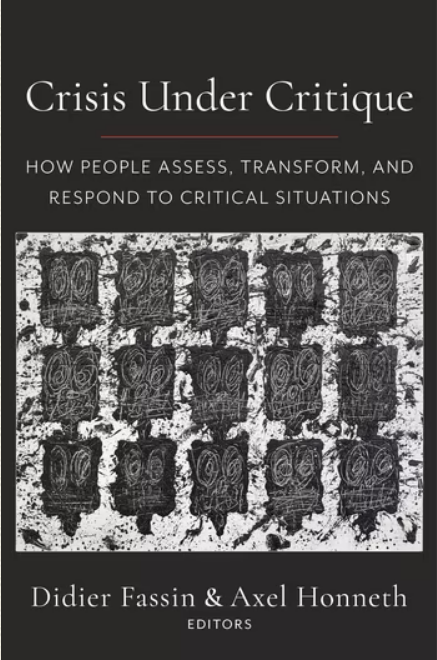Publications | Ouvrages
Crisis Under Critique
How People Assess, Transform, and Respond to Critical Situations
The word “crisis” denotes a break, a discontinuity, a rupture—a moment after which the normal order can continue no longer. Yet our political vocabulary today is suffused with the rhetoric of crisis, to the point that supposed abnormalities have been normalized. How can the notion of crisis be rethought in order to take stock of—and challenge—our understanding of the many predicaments in which we find ourselves?
Instead of diagnosing emergencies, Didier Fassin, Axel Honneth, and an assembly of leading thinkers examine how people experience, interpret, and contribute to the making of and the response to critical situations. Contributors inquire into the social production of crisis, evaluating a wide range of cases on five continents through the lenses of philosophy, sociology, anthropology, political science, history, and economics. Considering social movements, intellectual engagements, affected communities, and reflexive perspectives, the book foregrounds the perspectives of those most closely involved, bringing out the immediacy of crisis. Featuring analysis from below as well as above, from the inside as well as the outside, Crisis Under Critique is a singular intervention that utterly recasts one of today’s most crucial—yet most ambiguous—concepts.
About the Authors
- Didier Fassin is the James Wolfensohn Professor at the Institute for Advanced Study, a director of studies at the École des hautes études en sciences sociales, and former chair in public health at the Collège de France. He is coeditor of A Time for Critique (Columbia, 2019), among many other books.
- Axel Honneth is Jack C. Weinstein Professor for the Humanities in the Department of Philosophy at Columbia University and was formerly professor of social philosophy at Goethe-Universität Frankfurt am Main, where he also was the director of the Institute for Social Research. He is the author of numerous books, including Freedom’s Right: The Social Foundations of Democratic Life (Columbia, 2014).
Content
Acknowledgments
Introduction: The Heuristic of Crises: Reclaiming Critical Voices, by Didier Fassin and Axel Honneth
Part I. Social Movements
1. Capitalism Contested: Britain in the Aftermath of World War I, by Clara Elisabetta Mattei
2. Striking a Rock with Eggs: Resistance and Repression After Tiananmen, by Rowena Xiaoqing He
3. Undoing the Rule of Market Laws: Social Critique and the Making of Normative Futures, by Rodrigo Cordero
4. “Layoffs Are Murder, but They Are Also Everyday Life”: A Critique of Labor and Living in the Era of Ghost Capital, by Hae Yeon Choo
5. Remaking the Demos “from Below”? Critical Theory, Migrant Struggles, and Epistemic Resistance, by Robin Celikates
Part II. Intellectual Engagements
6. Peace, or the Moral Economy of War: Between W. E. B. Du Bois and Sayyid Quṭb, by Murad Idris
7. Personal Pronouns and Political Protest: Henry David Thoreau and Ta-Nehisi Coates as Critics in Times of Crisis, by Dieter Thomä
8. Becoming Anticolonial in Northern Namibia, 1950–1954: The Emergence of Both Crisis and Critique from Everyday Interpretations, by Gregor Dobler
9. How Do Technocrats Address Crises? From Structural to Humanitarian Approaches to Crises in Latin American Developmentalism, by Aldo Marchesi
10. Against Crisis: Violence and Continuity in Manus Island Prison, by Anne McNevin
Part III. Affected Communities
11. Love Trumps Hate: Community Caretaking in an Era of Mass Deportation, by Denise Brennan
12. Helping Refugees in Rural Germany: Ambivalences of Compassion, by Greta Wagner
13. Toward a Theory of Climate Praxis: Confronting Climate Change in a World of Struggle, by Daniel Aldana Cohen and David Bond
14. The Discovery of Contamination: Forever Chemicals and the Temporality of Critique, by David Bond
15. Democracy Without Demos: The Disappearance of the Working Class and the Rise of Abstention in French Political Life, by Anne-Claire Defossez
Part IV. Reflexive Perspectives
16. New Technologies and the Moral Economy of White Nationalism, by Hector Amaya
17. “The Only Way Out Is Through”: Anthropology as Critical Praxis in Times of Crisis, by Munira Khayyat
18. Social Movements and Social Theory, by Michael Walzer
19. The Invisible Rebellion: Working People Under the New Capitalist Economy, by Axel Honneth
20. Conspiracy Theories as Ambiguous Critique of Crisis, by Didier Fassin
Contributors
Index
- Columbia University Press, April 2022, 456 pages. ISBN Paperback: 9780231204330. ISBN Hardcover: 9780231204323. ISBN E-book: 9780231555487https://cup.columbia.edu/book/crisis-under-critique/9780231204330
ISBN : 9780231204330
Fiche éditeur : https://cup.columbia.edu/book/crisis-under-critique/9780231204330





